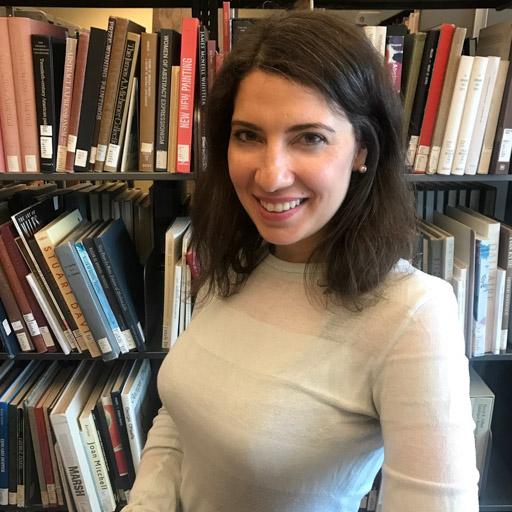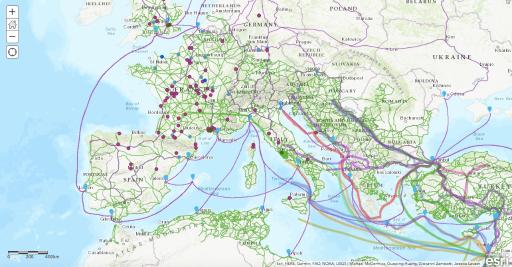
Dr. Anna-Maria Moubayed
- Part-time Faculty, Art History
Are you the profile owner?
Sign in to editResearch areas: Representations of Eve in Romanesque Sculpture, Digital Humanities, Spolia in Christian & Islamic Medieval Architecture, Body & Beauty in Medieval Art & Thought, Vernacular & Religious Literature, Theology, Women Issues, Neo-medievalism
Contact information
Availability:
Office hours: Mondays 4PM to 6PM, or by appointment.
ORCID:
Biography
Research Projects
FRQSC Postdoctoral Fellowship - Mobilisation des connaissances (2023-2024) "Le chemin des femmes - El camino de las mujeres: an interactive, multidisciplinary and inclusive journey along the Camino de Santiago in Navarra, Spain." Institute for Culture and Society, University of Navarra, Pamplona, Spain.FRQSC Postdoctoral Fellowship (2020-2023) "Of the Garden and Time: The Power of Eve's Body in Romanesque Sculpture, and Narratives of Identity." Institute for Culture and Society, Religion and Civil Society Research Group, University of Navarra, Pamplona, Spain.
Education
Ph.D. (2018) "All About Eve and Other Stories: Representations of Eve in French Romanesque Sculpture." Art History, Queen's University, Kingston.
M.A. (2010) "Saint-Antoine-de-Padoue Co-Cathedral: Christianity, Victorian Gothic Revival and Quebec's Colonial Hybrid Culture." Art History, Concordia University, Montreal.
B.F.A. (2007) Art History and Classical Archaeology, Concordia University, Montreal.
Research Interests
- Representations of Eve in Romanesque Sculpture
- Digital Humanities
- Issues of Spolia in Christian and Islamic Medieval Architecture
- Romanesque and Gothic Art and Architecture
- Vernacular and Religious Literature
- Sacred Plays
- Theology
- Women Issues
- The Body and Beauty in Medieval Art and Thought
- 19th-century Architecture / Neo-Medievalism
Distinctions & Awards
2023-2024- Fonds de Recherche du Québec - Société et Culture Postdoctoral Award - Mobilisation des connaissances
- Fonds de Recherche du Québec - Société et Culture Postdoctoral Award
- Social Sciences and Humanities Research Council of Canada Doctoral Award
- Alfred and Isabel Bader Graduate Fellowship in Art (Field Research in France)
- Senator Frank Carrel Fellowship

All About Eve and Other Stories: Representations of Eve in French Romanesque Sculpture (and more), Interactive Map. ArcGIS, 2018.
Publications
Recent Publications
Forthcoming. All About Eve and Other Stories: Representations of Eve in Romanesque Sculpture. Medieval and Early Modern Europe and the World Book Series. Turnhout: Brepols Publishers.
2023."The Charisma of Fruits from Greek Mythology to Genesis." Religions 14, no. 5: 585. https://doi.org/10.3390/rel14050585
2022."Chapelle Saint-Gabriel, Provence: A Study of Spolia, Gesture, and Sacred Drama." Peregrinations: Journal of Medieval Art and Architecture 8, no. 2: 68-115. https://digital.
2022. "A Polysemic Interpretation of the West Façade of Saint-Martin-de-Besse: Time, Space, and Chiasmus Carved in Stone" Religions 13, no. 2: 152. https://doi.org/10.3390/rel13020152
2022. "Monumental French Romanesque Sculptures of Eve in the Digital Humanities Age." In Construir para Perdurar (XLVII Semana Internacional de Estudios Medievales, Estella-Lizarra, 20/23 de julio de 2021).453-468. Pamplona: Gobierno de Navarra. https://doi.org/10.35462/siemel.47
2018. “Mapping French Romanesque Eve.” Dataverse, Scholars Portal Research Data Platform. Institute for Quantitative Social Sciences (IQSS), Harvard University and Ontario Council of University Libraries. http://dx.doi.org/10.5683/SP/2Y5C1X
2018. “All About Eve and Other Stories: Representations of Eve in French Romanesque Sculptures (and More).” Interactive Map. ArcGIS. https://arcg.is/10bL4u
2017. “Mapping Romanesque Eve: Art History and the Digital Humanities.” Data Day 2017: Building a Community. Queen's University Library, Kingston.http://library.queensu.ca/sites/default/files/Data%20Day%202017/anna-maria_moubayed_-_data_day_2017.pdf
Research and Digital Contributions for Recent Publications
Creation of digital maps of historical French colonial sites.
2022. Bailey, Gauvin Alexander. The Architecture of Empire: France in India and Southeast Asia, 1664-1962. Montréal and Kingston: McGill-Queen's University Press.
2018. Bailey, Gauvin Alexander. Architecture and Urbanism in the French Atlantic Empire: State, Church, and Society 1604-1830. Montréal and Kingston: McGill-Queen's University Press.
Archival research at Bibliothèque nationale de France, Paris. 2017. Morehead,Allison. Nature’s Experiments and the Search for Symbolist Form. University Park: Pennsylvania State University Press.
Conference Participation
Conferences, Lectures, and Seminars
2022Charisma in the Middle Ages (Université de Poitiers, France)
"Charisma of Fruits: From Greek Mythology to Genesis"
2021
47th Semana Internacional de Estudios Medievales (Estella, Spain)
“Monumental French Romanesque Sculptures of Eve in the Digital Humanities Age”
2020
6th European Congress on World and Global History : Minorities, Culture of Integration, and Patterns of Exclusion (Turku, Finland)
"Meaning in Translation: Issues of Spolia and Temporality in Medieval Christian and Islamic Architecture"
2019
One Week Seminar - Department of History, Art History, and Geography (Universidad de Navarra, Pamplona, Spain)
"Not So Dark After All: Medieval Art and Thought" (visiting scholar)
Religion and Civil Society - Institute for Culture and Society (Universidad de Navarra, Pamplona, Spain)
"Saint-Martin-de-Besse, Aquitaine: Its Meaning, Chiastic Narrative and Eve" (invited talk)
2017
Congress of the Federation for the Humanities and Social Sciences (Toronto) "Église Saint-Martin-de-Besse, Aquitaine: A Case Study of Eve's Romanesque Body and Decorative Patterns"
Data Day (Kingston) "Art History and the Digital Humanities: Mapping Romanesque Eve" (invited talk)
Canadian Conference of Medieval Art Historians (St. Catharines) "French Romanesque Sculptures of Eve in the Digital Humanities Age"
2016
Religion and Civil Society (Universidad de Navarra, Pamplona, Spain) "Decoding Eve's Romanesque Body" (invited talk)
The Afterlives of Eve Conference (Newcastle and Durham, U.K.) "Shaping the Female Body: French Romanesque Sculptures of Eve"
Canadian Conference of Medieval Art Historians (Quebec City) "Chapelle Saint-Gabriel-de-Tarascon, Provence: A Case Study of Eve's Romanesque Body"
2014
Context and Meaning Conference: Contact (Kingston) "Gothic Revival Architecture and the British Raj: Contact, Culture, and Colonialism"
2013
Renaissance and Baroque Art Seminar (Kunsthistorisches Museum & University of Vienna, Austria) "Parmigianino's Conversion of Saul"
Teaching Activities
ARTH 363 Studies in Medieval Art and Architecture
ARTH 384 Theories of Representation
ARTH 362 Studies in Early Christian and Byzantine Art and Architecture
FyL 1 Theory of Arts (Dept. Philosophy and Letters, Universidad de Navarra)
Research activities
Of the Garden and Time: The Power of Eve's Body in Romanesque Sculpture, and Narratives of Identity
Considering the close connections and filiation between literature and material culture, as well as the manifestation and performance in time and space of the monumental body of Eve, this research examines how Romanesque artistic and performative innovation offers new iconographies that challenge and create a dialogue with textual analogues and liturgy.Focusing on a dataset of 178 representations of Eve, it also explores through three case studies the tensions between depictions of the body of Eve and their theological, literary, and cultural significance in the context of twelfth-century monumental sculpture. It addresses the powerfully staged images of the female body within a culture of spiritual effervescence, through liturgy and the sacraments.
This innovative project pursues a synthetic approach that combines methods from art history, philology, theology, philosophy, and digital humanities. It makes interdisciplinary connections between material culture, historiography, theology, as well as medieval vernacular literature, sacred plays and the concepts of time and space. Engaging formal analysis, ethics and gesture, semiotics, and feminism, the research outputs situate the project within the digital humanities through a database, statistics analysis, and interactive, collaborative map.
El camino de las mujeres: An Alternative Way of St James
Focusing on the presence of women on the Way of St James in Navarra (Spain), the project involves villages and towns along an alternative medieval route. The project aims to highlight Classical and Medieval artworks representing women, as well as propelling rural economy and agro-eco tourism in the region.Eve and St Lazarus in Time of Leprosy: A Study of the Romanesque Body and Homo Sacer
It first presents the historical and archaeological context of Saint-Lazare Cathedral followed by a historiographical overview of the sculpture. It then proposes an overview of the medieval understanding of leprosy and the cult of Saint-Lazarus. The project is also concerned with Giorgio Agamben's Homo Sacer: the sacred man, one that may be killed and yet not murdered and who, like a leper, is both holy and damned.
Following a thorough analysis of Eve's body and its meaning within the cathedral's north portal sculptural programme, this project also provides a discussion of a possible alabaster copy which hints towards the lintel's original composition, which included the now missing Adam. Finally, exploring the meaning of Eve's flesh, the research enables a complex repositioning of her body, not only as an intersection of multiple narrative sequences from Genesis, but also as a connecting agent of the Genesis narrative to the cathedral’s pilgrimage function, the cult of its patron saint, and its numerous pilgrims suffering from leprosy.


